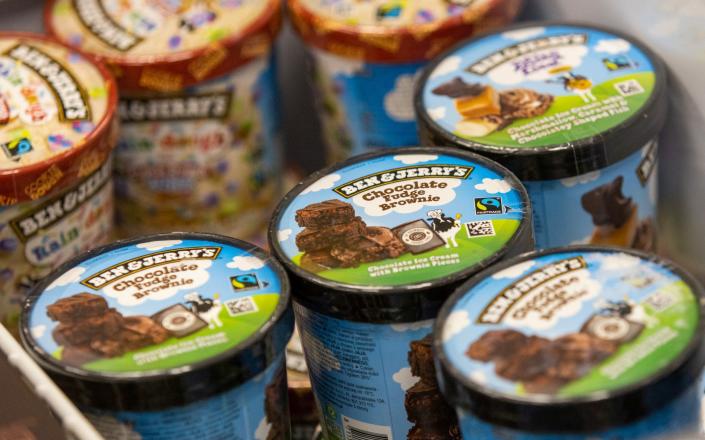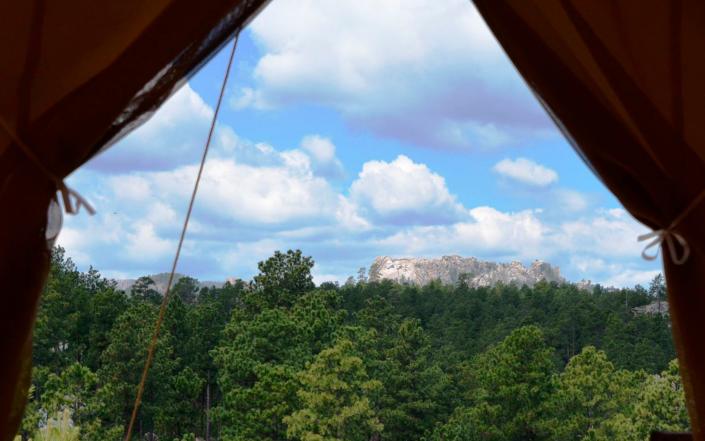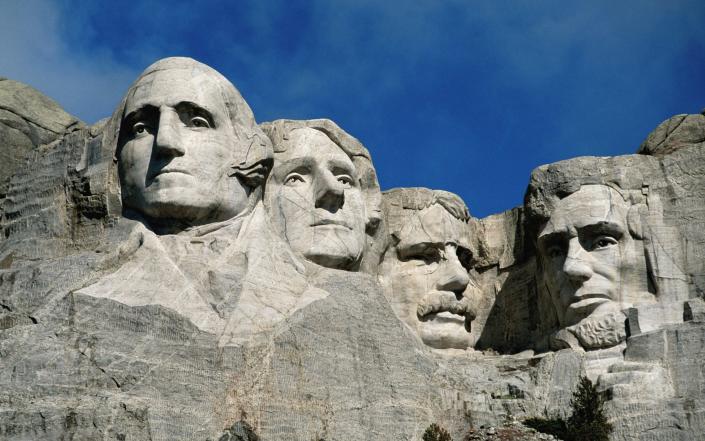
Jared Gans
Wed, July 5, 2023
Ben & Jerry’s called for the return of “stolen indigenous land” in its Fourth of July message, pointing to Mount Rushmore as the place to start.
The ice cream company said in a post on its website that the parades, barbecues and fireworks are displays typical of the holiday can “distract” from the “essential truth” of the birth of the United States — that it was founded by taking land from Indigenous populations.
“This 4th of July, it’s high time we recognize that the US exists on stolen Indigenous land and commit to returning it,” the company tweeted.
The post outlines the history of the land that became Mount Rushmore, which features the likenesses of four presidents — George Washington, Thomas Jefferson, Theodore Roosevelt and Abraham Lincoln — carved into the mountain.
Ben & Jerry’s said the mountain was previously known as Tunkasila Sakpe for the Lakota Sioux tribe and was seen as a sacred, holy mountain in the Black Hills of what is now South Dakota.
The company said the Lakota and other Indigenous tribes signed two treaties with the United States in the 1850s and 1860s after decades of fighting, establishing a home for them of 35 million acres including the Black Hills.
But the U.S. government broke those treaties after gold was discovered a few years later, and prospectors and settlers moved into the area. This forced the Sioux, a group of tribes known by that name, to give up their land and move to smaller reservations.
“From there, in 1927, they watched as their holy mountain, now located on land known as South Dakota, was desecrated and dynamited to honor their colonizers, four white men—two of whom enslaved people and all of whom were hostile to Indigenous people and values,” Ben & Jerry’s wrote.
The Supreme Court ruled in 1980 that that the land was stolen and awarded the Sioux more than $100 million, but the tribes have refused payment, because they argue they want the land back.
The post said the money has been held in a trust that has gained interest since then, and the tribes still refuse to take it despite living in among the poorest communities in the country.
“Why are we talking about this? Because on the Fourth of July many people in the US celebrate liberty and independence—our country’s and our own,” the company said.
“But what is the meaning of Independence Day for those whose land this country stole, those who were murdered and forced with brutal violence onto reservations, those who were pushed from their holy places and denied their freedom?” it added.
Ben & Jerry's faces Bud Light-style boycott over controversial Forth of July tweet
David Millward
Wed, July 5, 2023

Conservatives hit out against the 'woke ice creamer' - Bloomberg
Conservatives are threatening a Bud Light-style boycott of Ben & Jerry’s after it urged the US to return “stolen indigenous land” in an Independence Day tweet.
The ice-cream maker, now owned by British multinational Unilever, on the July 4 holiday called for Mount Rushmore to be handed back to the Lakota Sioux tribe.
“This 4th of July, it’s high time we recognise that the US exists on stolen Indigenous land and commit to returning it,” it said.
“The faces on Mount Rushmore are the faces of men who actively worked to destroy Indigenous cultures and ways of life, to deny Indigenous people their basic rights,” the statement added.
This content is not available due to your privacy preferences.Update your settings here to see it.
Conservative critics rounded on what they regarded as the unpatriotic intervention on one of the most important days of the year in the US, accusing Ben & Jerry’s of “biting the hand that feeds you”.
“Make Ben & Jerry’s Bud Light again,” John Rich, a member of the country music duo Big & Rich, said.
Lavern Spicer, a failed Republican candidate, also hit out against the “woke ice creamer”.
“Ben & Jerry’s used Independence Day to speak out AGAINST AMERICA,” Ms Spicer said.
“Will the day ever come when these AMERICA-hating corporations realize what happens when you bite the hand that feeds you?” She added.
The Vermont-based company is the latest corporation to be accused of being “woke” in America’s culture war.
Brewing behemoth Anheuser-Busch saw Bud Light sales plummet by around 30 per cent following its partnership with trans influencer Dylan Mulvaney.
Social media users warned of a similar downturn for Ben & Jerry’s after its intervention on the Mount Rushmore issue was aired to the company’s 494,000 Twitter followers.

A view of Mount Rushmore - Rapid City Journal
“I guess Ben and Jerry’s will find out that it’s just as easy for us to reach into the adjacent freezer for a different brand of ice cream as it is to take a step over to the next refrigerator to buy something other than Bud Light,” Twitter user ShotGunBonnie said.
Ben & Jerry’s statement called for wider indigenous land returns to begin with Mount Rushmore, the cherished national memorial in South Dakota in which the heads of four American presidents were sculpted into the rock.
This, they said, represented a desecration of a mountain known as Tunkasila Sakpe.
The land has been in dispute for decades. The Sioux tribe refused a $105 million payment for it in 1980, saying the land was not for sale.

The heads of four American presidents sculpted into rock at Mount Rushmore -
Philippe Bourseiller
Ben & Jerry’s statement marked the latest political intervention by the company, which was founded at a Vermont filling station in 1978 by Ben Cohen and Jerry Greenfield. Both are friends of Left-wing senator Bernie Sanders.
The brand’s hipster reputation has been forged by activism, even though it has been owned by Unilever since 2000.
As part of the deal, Ben & Jerry’s has a separate board which allows it to speak out on political issues. And it has not been slow to do so.
In 2019, it launched a flavour, “Justice ReMix’d”, a concoction of cinnamon and chocolate to call for an end to “structural racism in our broken criminal legal system”.
And last year it dipped into British politics, attacking then-Home Secretary Priti Patel’s plans to send asylum seekers to Rwanda.
Unilever’s hands-off approach to Ben & Jerry’s activism ended with a clash over Israel.
Ben & Jerry’s announced it would stop selling ice cream in Israel’s occupied territories in 2021.
Unilever responded by selling its Israeli interests to a local company enabling sales to resume - and Ben & Jerry’s sued its parent company.
In the wake of the latest controversy, experts suggested the company’s July 4 tweet could end up being a massive own goal.
“While Ben & Jerry’s is one of the brands most associated with liberal causes and one could see this message as being on-brand for them, they’ve stumbled here,” Professor Tony D’Angelo, of the Newhouse School of Communications at Syracuse University, told The Telegraph.
“The July 4th timing of such an extreme suggestion is designed to generate attention, but this is especially controversial because it’s not at all clear how the US could even attempt to return the entirety of ‘stolen indigenous land’.
“Therefore Ben & Jerry’s tweet comes off as sanctimonious virtue signalling rather than sincere support of social justice.”
The Telegraph has approached Ben & Jerry’s for comment.
Ben & Jerry’s statement marked the latest political intervention by the company, which was founded at a Vermont filling station in 1978 by Ben Cohen and Jerry Greenfield. Both are friends of Left-wing senator Bernie Sanders.
The brand’s hipster reputation has been forged by activism, even though it has been owned by Unilever since 2000.
As part of the deal, Ben & Jerry’s has a separate board which allows it to speak out on political issues. And it has not been slow to do so.
In 2019, it launched a flavour, “Justice ReMix’d”, a concoction of cinnamon and chocolate to call for an end to “structural racism in our broken criminal legal system”.
And last year it dipped into British politics, attacking then-Home Secretary Priti Patel’s plans to send asylum seekers to Rwanda.
Unilever’s hands-off approach to Ben & Jerry’s activism ended with a clash over Israel.
Ben & Jerry’s announced it would stop selling ice cream in Israel’s occupied territories in 2021.
Unilever responded by selling its Israeli interests to a local company enabling sales to resume - and Ben & Jerry’s sued its parent company.
In the wake of the latest controversy, experts suggested the company’s July 4 tweet could end up being a massive own goal.
“While Ben & Jerry’s is one of the brands most associated with liberal causes and one could see this message as being on-brand for them, they’ve stumbled here,” Professor Tony D’Angelo, of the Newhouse School of Communications at Syracuse University, told The Telegraph.
“The July 4th timing of such an extreme suggestion is designed to generate attention, but this is especially controversial because it’s not at all clear how the US could even attempt to return the entirety of ‘stolen indigenous land’.
“Therefore Ben & Jerry’s tweet comes off as sanctimonious virtue signalling rather than sincere support of social justice.”
The Telegraph has approached Ben & Jerry’s for comment.
No comments:
Post a Comment